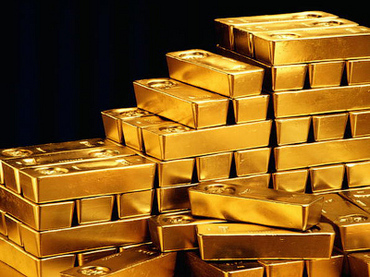Iran may be arranging to sell oil to India for gold instead of the U.S. dollar, according to intelligence reports out of the Middle East. China also is mulling using its huge stockpile of gold to buy oil from Iran, according to these reports.
Oil is bought and sold in U.S. dollars all over the world. But the United States and many European governments have imposed sanctions to shut down Iran’s financial institutions and the country’s ability to trade its oil. The governments say the sanctions are to deter Iran’s government from developing a nuclear weapon.
Using gold to buy oil would be an attempt to get around the sanctions. Some experts say the move would harm the value of the dollar and the U.S. economy. It could also harm other countries that hold dollars to facilitate international trading.
On the other hand, countries that have large amounts of dollar-denominated debt (International Monetary Fund lending, for instance, is in dollars) could benefit from a loss of value in the dollar.
Monetary Policy Rebuke
Brian Domitrovic, chairman of the history department at Sam Houston State University and author of Econoclasts: The Rebels Who Sparked the Supply-Side Revolution and Restored American Prosperity (ISI Books, 2009), says a move away from the dollar would be a rebuke to U.S. government economic policies.
“Settling contracts in gold would be another worldwide ‘vote’ on Fed monetary policy. This would supplement the vote represented by the gold price itself [which has soared in dollar terms over the past 10 years),” he said.
“The message is for the Fed and Treasury to get their act together to stabilize the value of the dollar,” Domitrovic said. “But also, the move is an indication that the worldwide dollar standard, even if benignly maintained, is not good enough. There should not be a national unit that is the common reserve currency globally. There should be an international unit – and gold is the most logical, practical, and respected.
“As for the Iran focus of all this, Iran needs cash badly, and they’d rather not have devaluing cash. In this they differed from the USSR, which in the 1970s gladly took U.S. dollars for commodities even though those dollars were depreciating.”
1970s Dollar Deal
The U.S. dollar has had a lock on oil trading since President Richard Nixon “closed the gold window” and ended convertibility of the dollar to gold in 1971. To keep the dollar from collapsing after removing the backing of gold, Nixon struck a deal with the Saudi Arabian government to sell oil only in dollars and invest profits in U.S. Treasury debt. Soon the rest of the OPEC nations followed suit, cementing the dollar as the oil trading currency and spurring worldwide demand for U.S. dollars and debt.
In 2000, Iraq began selling oil in euros. After United States-led military forces invaded Iraq and overthrew Iraqi leader Saddam Hussein in 2003, Iraq’s oil was again sold in dollars.
Logical Alternative
“I do believe that nations are dabbling with replacing the dollar with something, and gold is a logical alternative,” said economist Patrick Barron, who teaches bank management at the University of Wisconsin–Madison and runs his own banking consulting firm. “Perhaps the world will quietly slide back into an international gold standard. That would be a welcome development.”
Jeffrey Bell has long advocated using gold to back currencies. He is director of the American Principles Project, advisor to The Gold Standard Now, and author of Social Conservatism: The Movement that Polarized American Politics (Encounter Books, 2012).
He said he has read reports of India and China possibly using gold to buy Iranian oil but has his doubts.
“If a country has the sense to want to have greater holdings of gold as a monetary reserve, that same country isn’t going to want to send its gold right back out the door,” he said. “I’d like to see gold as the ultimate money of the world. But if India and China have been acquiring gold, what is the logic of paying for oil with it?
“They both have enormous dollar reserves. If I were them, as a pure business matter, I’d say, ‘Send our devaluing dollars out the door. Save our gold for another time.'”
Dollar Defection?
Marin Katusa, chief energy investment strategist for Casey Research, believes the dollar could be headed out the door as the world’s reserve currency.
“2012 might end up being most famous as the year in which the world defected from the US dollar as the global currency of choice,” Katusa wrote in a Jan. 25 Casey Research analysis. “Imagine the rest of the world doing the math and, little by little, beginning to do business in their own currencies and investing ever less of their surpluses in US Treasuries. It constitutes nothing less than a slow but sure decimation of the dollar.”





